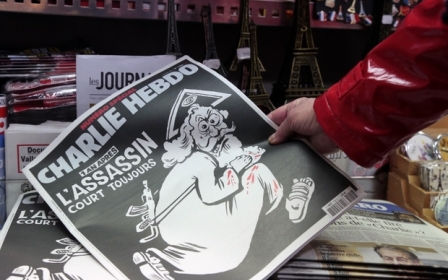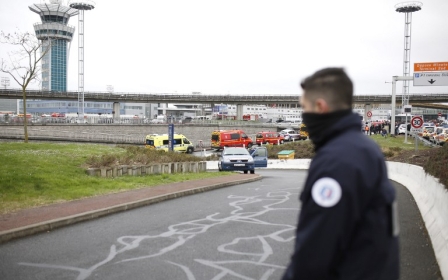French police shoot attacker outside Notre Dame in Paris

French police shot and injured a man who attacked an officer with a hammer outside Paris's Notre Dame cathedral, while shouting "this is for Syria".
Police sources said the officer sustained only minor neck injuries in the assault, which comes with France on high alert after militants killed seven people in London on Saturday.
The suspect later claimed to be a "soldier of the caliphate" of the Islamic State (IS) group, according to a source close to the investigation.
The policeman's colleague opened fire on the man, hitting him in the chest amid panicked scenes around the Gothic cathedral that is one of France's most visited tourist attractions.
One tourist tweeted how he was asked to raise his hands by police in the cathedral as part of security measures.
The man lay bleeding on the ground as police sealed off the area and searched for possible accomplices.
About an hour after the attack he was taken to hospital and police declared the situation to be under control.
France has been in a state of emergency since attacks by militants in Paris killed 130 people in 2015.
Interior Minister Gerard Collomb said the man had shouted "this is for Syria" as he lunged at the officer.
He said the man had also been carrying "kitchen knives" and was found in possession of a card identifying him as an Algerian student.
Anti-terrorist prosecutors were put in charge of the investigation.
A witness told AFP he heard someone "shout very loudly".
"Then there was a crowd surge and people panicked. I heard two shots and saw a man lying on the ground in a pool of blood," he said.
Notre Dame, which is situated on the banks of the Seine river in the heart of Paris, draws 13 million visitors a year.
Over 1,000 people were inside the cathedral at the time of the attack.
Authorities in Paris asked the public to stay away from the area.
Pictures on social media showed people sitting in the pews with their hands in the air - apparently at the request of police.
Andre Finot, the cathedral's head of communications, described the situation as calm. "People are talking to each other, praying and continuing their visit," he said.
In September, Notre Dame was already the scene of a scare after a car full of gas canisters was found parked nearby.
The car was tracked to an all-female terrorist cell, allegedly acting on the orders of Syria-based Islamic State militants.
Renewed state of emergency
Tuesday's incident comes three days after extremists used a van and knives to crush to death and kill seven people enjoying a night out in London. One of the victims was French.
France is still under the state of emergency imposed after the November 2015 attacks in Paris, when Islamic State militants killed 130 people in a night of carnage at venues across the city.
President Emmanuel Macron's new centrist government recently announced plans to extend the emergency measures in November, drawing some criticism from rights groups.
The authorities have pointed to a string of attacks since January 2015 that have claimed the lives of over 230 people as justification for boosting the powers of the police.
While France has been Islamic State's main target in western Europe, the focus in recent weeks has shifted to Britain.
Two weeks before the London attack, a suicide bomber killed 22 people including seven children at a concert by US singer Ariana Grande in the northwestern English city of Manchester.
The last fatal attack in France dates to 20 April, when a policeman was shot dead on Paris's prestigious Champs-Elysees avenue, three days before the first round of the presidential election.
Previous major attacks targeted the Charlie Hebdo satirical magazine in January 2015 and in November that year, gunmen and suicide bombers attacked venues around Paris including the Bataclan concert hall, killing 130 people.
Then in July last year, a radicalised Tunisian man drove a lorry at high speed through a Bastille Day fireworks display on the Nice waterfront, massacring 86 people.
Since then there have been a series of smaller attacks, often targeting security forces.
Stay informed with MEE's newsletters
Sign up to get the latest alerts, insights and analysis, starting with Turkey Unpacked
Middle East Eye delivers independent and unrivalled coverage and analysis of the Middle East, North Africa and beyond. To learn more about republishing this content and the associated fees, please fill out this form. More about MEE can be found here.




